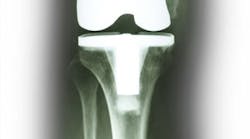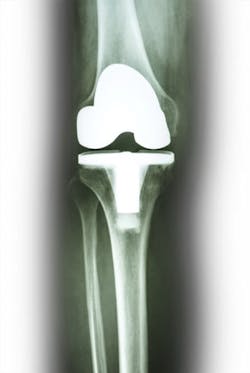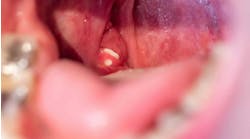Unsure about the latest antibiotic premedication protocols for dental care?
You're not alone; the science is still evolving
By Lory Laughter, RDH, BS, MS
Science and dentistry go hand in hand. Treatment, education, and recommendations in our profession need to be based on scientific fact and evidence-based outcomes. Unfortunately, when it comes to the topic of antibiotic premedication for joint replacements, the facts seem to get buried under opinion and fear.
While I was in graduate school, my research was on antibiotic premedication for joint replacements. Since there is so much confusion among those of us in the dental field, I decided to interview orthopedic surgeons. As the guidelines come from the American Academy of Orthopaedic Surgeons (AAOS), my thought was that the surgeons could provide more clarity.
I chose this topic because-although over 1 million total joint replacement (TJR) surgeries are performed in the United States each year-there is controversy among orthopedic surgeons about the appropriate antibiotic premedication for dental patients who have undergone TJR.1,2 This controversy creates confusion among dental professionals regarding antibiotic premedication recommendations for their patients with TJR.
Make up your mind
Contributing to the confusion is the fact there is no well-documented evidence that infected TJRs are caused by bacterial species specific to a dental procedure.3 Also, the AAOS has changed the premedication guidelines three times since 2003. These changes are not only confusing to patients, but can be frustrating to dental care providers who attempt to answer questions regarding the changes. I've had a patient say to me, "Can't you guys just make up your mind?" Explaining to them that science is not stagnant does not always satisfy their queries.
In 2012, the AAOS recommended a consideration to discontinue antibiotic premedication based solely on a patient having TJR. A statement from their decision reads, "Moderate strength evidence finds that dental procedures are unrelated to implant infection and that antibiotic prophylaxis prior to dental procedures does not reduce the risk of subsequent implant infection. There is no direct evidence to support otherwise. High strength evidence suggests that antibiotic prophylaxis reduces the incidence of post-dental procedure related bacteremia, but there is no evidence that these bacteremias are related to prosthetic joint infections."4
Even with no scientific evidence to support antibiotic premedication for TJR patients, it has been a change met with much resistance. Of the three surgeons I interviewed, each had a different opinion on the guidelines. One surgeon said the 2012 guidelines make sense and he trusts the AAOS was thorough in their research and recommendations. He also stated the guidelines leave little room for personal discretion.
The second surgeon does not agree with the 2012 guidelines and said he believes all TJR patients need antibiotic coverage prior to dental treatment. The final surgeon stated he does not believe he has ever seen guidelines in writing and believes it is more of a generalized knowledge. He also believes patients need coverage specifically for dental cleanings.
ADA statement
With no consensus among orthopedic surgeons, it's easy to understand why there's confusion in dentistry. To that end, in January 2015 the ADA published guidelines regarding antibiotic premedication for joint replacement dental patients. The ADA concluded that evidence fails to demonstrate an association between dental procedures and prosthetic joint infection or any effectiveness for antibiotic prophylaxis. It reads, "Given this information in conjunction with the potential harm from antibiotic use, using antibiotics before dental procedures is not recommended to prevent prosthetic joint infections."
To my thinking, the ADA statement is clear and concise. Yet the controversy continues. Among the surgeons I interviewed, one recommends antibiotic premedication only to high-risk patients. He considers anyone who has had a previous infection of a prosthetic joint or has a suppressed immune system due to disease or medication to be at high risk. He added, "In my mind, [antibiotic premedication] is something you need to be judicious about. You certainly don't want to give it to everybody."
Another surgeon was adamant that all TJR patients should have antibiotic premedication prior to any dental treatment. He stated, "I basically just have my own regime that I use ... I cover three days. One day before, day of, and day after." The third surgeon believed antibiotics are needed but should be prescribed only for the specific bacteria that might be a problem. He gave a lot of credit to the knowledge of dentists, saying, "Dentists are generally more up to speed on what antibiotics are appropriate for oral organisms, so I let them choose which antibiotic to administer..."
Although there is a lack of evidence showing dental treatment and oral bacteria cause prosthetic joint infections, many in the medical and dental field remain fearful of infection and therefore continue to prescribe antibiotic premedication. As evidence becomes more apparent and further studies solidly confirm or dismiss a relationship between dental procedures and TJR infections, hopefully the confusion will be eliminated.
I doubt this controversy will end any time soon. Much in medicine and dentistry is rooted in opinion and tradition. A phrase we often hear is, "When I was in school we learned ..." It doesn't matter if school was two or 22 years ago; we tend to stick with what we learned. For the sake of science and patient safety, science needs to have more of an impact on our decisions. RDH
References
1. Skaar DD, O'Connor H, Hodges JS, Michalowicz BS. Dental procedures and subsequent prosthetic joint infections: findings from the Medicare current beneficiaries. J Am Dent Assoc. 2011;142(12):1343-51.
2. Colterjohn T, de Beer J, Petruccelli D, Zabtia N, Winemaker M. Antibiotic prophylaxis for dental procedures at risk of causing bacteremia among post-total joint arthroplasty patients: a survey of Canadian orthopaedic surgeons and dental surgeons. J Arthroplasty. 2014;29(6):1091-7. doi: 10.1016/ j.arth.2013.11.024. Epub 2013 Dec 2
3. Aminoshariae A, Kulild J. Premedication of patients undergoing dental procedures causing bacteremia after total joint arthroplasty. J Endod. 2010;36(6):974-7. doi: 10.1016/j.joen.2010.03.027. Epub 2010 Apr 24. Review.
4. American Academy of Orthopaedic Surgeons and the American Dental Association Prevention of Orthopaedic Implant Infection in Patients Undergoing Dental Procedures Guideline. Rosemont (IL): AAOS: 2012.
Lory Laughter, RDH, BS, MS practices clinically in Napa, Calif. She is owner of Dental IQ, a business responsible for the Annual Napa Dental Experience. Lory combines her love for travel with speaking nationally on a variety of topics. She is also an adjunct faculty member at Cabrillo College and is a part-time educator or consultant for American Eagle and Livionex. She can be contacted at [email protected].







